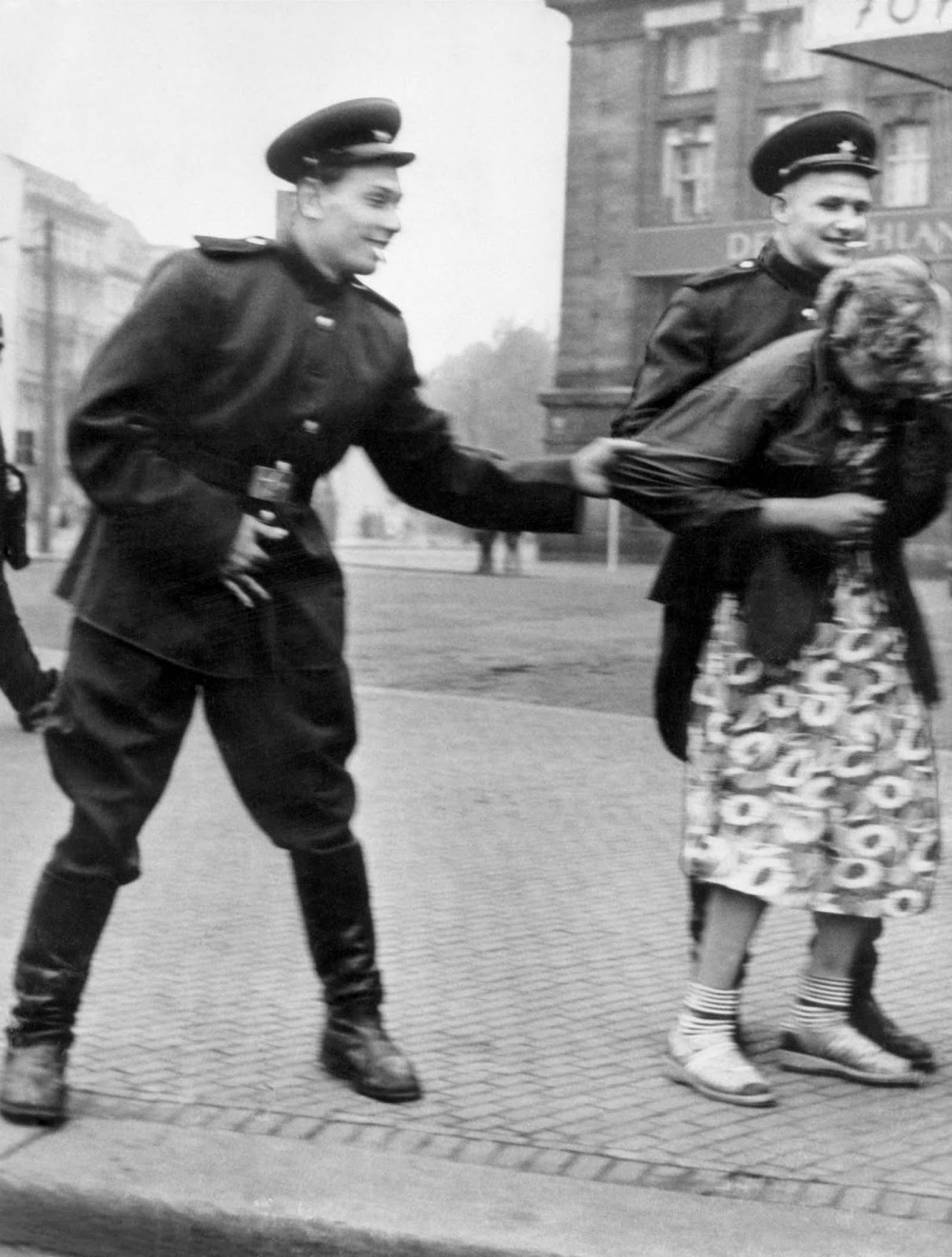So, when I grew up, the bombings of Dresden was always portrayed as an example of allied war crimes. And I believed that shit too. "The Nazis had to be stopped, but Dresden was taking it too far".
However, after learning more about WW2, it's pretty clear how the western perception of the Dresden bombings has been primarily influenced by the nazi propaganda. I used to think 300 000 people died there, and that the bombers strafed civilians. The real body count has been determined to be between 20 000-25 000, and the strafing runs never happened, as they were flying too high to do so. The massive death numbers, strafing anecdotes, and that it was a purely civilian target, was the narrative the nazis pushed right after. And it stuck here in the west too. But it was all lies.
Been reading a lot about the Nuremberg trials too. And it seems like the fact that Speer avoided the noose, have influenced a lot of the perception too. Just a "good German". And they didn't even have Konrad Meyer on trial in Nuremberg, even though he definitely should, since he was one of the main planners of the Hunger Plan. And then there's the whole Clean Wehrmacht myth, pushed by German post-war leaders, and getting adopted to some degree in the west that it was really only SS and the hardcore nazis that committed atrocities on a massive scale. Even though over 2 million Soviet POWs died of starvation in the first five months of Barborossa, under control of Wehrmacht, at a time when Germany had food enough to keep them all fed. Germans were better fed than Brits at that time, and only the US had better food security than Germany at that point in the war.
And this leads me to the Red Army mass rapes.
Not saying the Red Army didn't rape at all, and were treating the German civilians great. But how much of this perception of mass rapes can be attributed to Nazi propaganda?
It's pretty much accepted in the west that 100 000 women were raped in Berlin after liberation, by Red Army soldiers. However, when I try to find the source of that number, it's seems not very reliable. Basically, just one clinic, where they attribute every child born to a Russian father, as a result of rape(prostitution is regarded as rape too). Then they assume 20% of all rapes lead to pregnancy in a fertile woman. And then they assume 90% of the ones getting pregnant due to rape, got an abortion. And then they attribute those statistics to the whole of Berlin. Basically, this is very bad science, with such shitload of uncertain factors that it shouldn't be regarded as truth.
Every massive number I can find on the women raped by Red Army soldiers seems to be based on extremely biased sources and bad science.
German women killed themselves in large numbers when Soviet troops got closer. The statistics behind that seems pretty solid. But they did so because they listened to the Nazi narrative that the Russian hordes would rape and murder them all, and death would be preferable Sort of like how Japanese civilians killed themselves in large numbers when American troops closed in on some of the populated islands. But do we have evidence that rape really did happen on such a massive scale? Stalin did issue a directive regarding the proper treatment of civilians in occupied areas. And the Red Army did execute thousands for mistreatment, according to Russian sources. Of course, it's possible this was ignored by a lot, and some commanders might have been more lenient than others, and allow mass rapes to happen. But it seems like they were under the same rules as the western allies, and often facing worse punishment if they broke those rules.
I just don't think there's a way to know for sure if the Red Army really committed mass rapes on the scale that most people believe today. Obviously rape happened, but are we being influenced the same way in this, as we were about Dresden?
Are we still influenced by nazi propaganda?
-
Ex-California

- Posts: 4116
- Joined: Tue Nov 29, 2016 11:37 pm
Re: Are we still influenced by nazi propaganda?
I've never really thought about this either. Very interesting.
I always thought it was a given that any of the firebombing in WWII was a bridge too far, but your numbers tell a different story
I've always been a bit dubious about the stories of the Red Army going into Germany just because the US propaganda machine was already ramping up to have the USSR as an adversary before WWII was over
I always thought it was a given that any of the firebombing in WWII was a bridge too far, but your numbers tell a different story
I've always been a bit dubious about the stories of the Red Army going into Germany just because the US propaganda machine was already ramping up to have the USSR as an adversary before WWII was over
No man's life, liberty, or property are safe while the legislature is in session
-
Speaker to Animals

- Posts: 38685
- Joined: Wed Nov 30, 2016 5:59 pm
Re: Are we still influenced by nazi propaganda?
You definitely don't want hundreds of thousands of Russians cruising through your city. There will be rape.
-
Ex-California

- Posts: 4116
- Joined: Tue Nov 29, 2016 11:37 pm
Re: Are we still influenced by nazi propaganda?
That's been true of invasions since time immemorial thoughSpeaker to Animals wrote:You definitely don't want hundreds of thousands of Russians cruising through your city. There will be rape.
No man's life, liberty, or property are safe while the legislature is in session
-
Otern

- Posts: 720
- Joined: Sun Dec 04, 2016 2:13 am
Re: Are we still influenced by nazi propaganda?
Dresden had a lot of important industrial targets, like the IG Farben, who made chemical weapons and Zyklon B. Artillery factories, Zeiss optics, and lots more. Also, at that time, it was a crucial transport hub, for both refugees coming from the east, and for soldiers going to fight a Soviet offensive in Silesia. It was definitely a military target.California wrote:I've never really thought about this either. Very interesting.
I always thought it was a given that any of the firebombing in WWII was a bridge too far, but your numbers tell a different story
I've always been a bit dubious about the stories of the Red Army going into Germany just because the US propaganda machine was already ramping up to have the USSR as an adversary before WWII was over
But they didn't just target factories and infrastructure crucial to the war effort. They targeted residential areas too. And it's for this, a lot of the public perception towards strategic bombing in WW2 seems to be opposed to the allies.
I think it's important to keep in mind there's a difference between targeting residential areas, and wanton slaughter of civilians though. The directives opening for bombing of residential areas lay out the effects pretty clear, from lessons learned from the Coventry blitz. It was to knock out the morale of the Germans, because according to what the allies learned from Coventry, loss of homes had a far greater impact than loss of lives when it came to keeping social cohesion together. The idea was to make them homeless, and that way, put even more pressure on the already stretched infrastructure of Germany.
If the Allies wanted to kill as many Germans as possible, they wouldn't resort to strategic bombing of cities. For every two German civilians killed, they lost an airman. If they wanted to kill as many Germans as possible, they'd just use chemicals sprayed from bombers over the agricultural areas left in Germany. It's impossible to cover those huge areas with flak or fighters, and the allies would lose way fewer airmen. But they didn't do that.
-
Otern

- Posts: 720
- Joined: Sun Dec 04, 2016 2:13 am
Re: Are we still influenced by nazi propaganda?
Pretty much this.California wrote:That's been true of invasions since time immemorial thoughSpeaker to Animals wrote:You definitely don't want hundreds of thousands of Russians cruising through your city. There will be rape.
Do I believe soldiers of the Red Army committed rape on civilian Germans? Sure.
Did they rape more than for example the Americans or the Brits? Probably, simply because they were more numerous. They had way more soldiers in the field than the Brits or Americans, so they probably had a lot more rapists in their ranks too. And they did have plenty of reasons to be pissed off beyond comprehension, compared to the level of personal anger your average American or Brit would feel.
But was it a rape bonanza free for all, with the higher ups in the Soviet army supporting it? No evidence to support that. But there is evidence to support the claim that this was a narrative pushed by Nazi propaganda.
-
Speaker to Animals

- Posts: 38685
- Joined: Wed Nov 30, 2016 5:59 pm
Re: Are we still influenced by nazi propaganda?
Militant atheist army.
You better believe they raped and plundered more than anybody.
You better believe they raped and plundered more than anybody.
-
Fife

- Posts: 15157
- Joined: Wed Nov 30, 2016 9:47 am
-
Fife

- Posts: 15157
- Joined: Wed Nov 30, 2016 9:47 am
Re: Are we still influenced by nazi propaganda?
https://www.amazon.com/Crimes-Unspoken- ... 01MZ27S39/
The soldiers who occupied Germany after the Second World War were not only liberators: they also brought with them a new threat, as women throughout the country became victims of sexual violence. In this disturbing and carefully researched book, the historian Miriam Gebhardt reveals for the first time the scale of this human tragedy, which continued long after the hostilities had ended.
Discussion in recent years of the rape of German women committed at the end of the war has focused almost exclusively on the crimes committed by Soviet soldiers, but Gebhardt shows that this picture is misleading. Crimes were committed as much by the Western Allies - American, French and British - as by the members of the Red Army, and they occurred not only in Berlin but throughout Germany. Nor was the suffering limited to the immediate aftermath of the war. Gebhardt powerfully recounts how raped women continued to be the victims of doctors, who arbitrarily granted or refused abortions, welfare workers, who put pregnant women in homes, and wider society, which even today prefers to ignore these crimes.
Crimes Unspoken is the first historical account to expose the true extent of sexual violence in Germany at the end of the war, offering valuable new insight into a key period of 20th century history.
The soldiers who occupied Germany after the Second World War were not only liberators: they also brought with them a new threat, as women throughout the country became victims of sexual violence. In this disturbing and carefully researched book, the historian Miriam Gebhardt reveals for the first time the scale of this human tragedy, which continued long after the hostilities had ended.
Discussion in recent years of the rape of German women committed at the end of the war has focused almost exclusively on the crimes committed by Soviet soldiers, but Gebhardt shows that this picture is misleading. Crimes were committed as much by the Western Allies - American, French and British - as by the members of the Red Army, and they occurred not only in Berlin but throughout Germany. Nor was the suffering limited to the immediate aftermath of the war. Gebhardt powerfully recounts how raped women continued to be the victims of doctors, who arbitrarily granted or refused abortions, welfare workers, who put pregnant women in homes, and wider society, which even today prefers to ignore these crimes.
Crimes Unspoken is the first historical account to expose the true extent of sexual violence in Germany at the end of the war, offering valuable new insight into a key period of 20th century history.
-
Otern

- Posts: 720
- Joined: Sun Dec 04, 2016 2:13 am
Re: Are we still influenced by nazi propaganda?
But the soldiers weren't primarily atheists. And it's not like it has been proven that atheists rape more than anyone else.Speaker to Animals wrote:Militant atheist army.
You better believe they raped and plundered more than anybody.
It fits the stereotype of the brutish slav untermenschen though.
